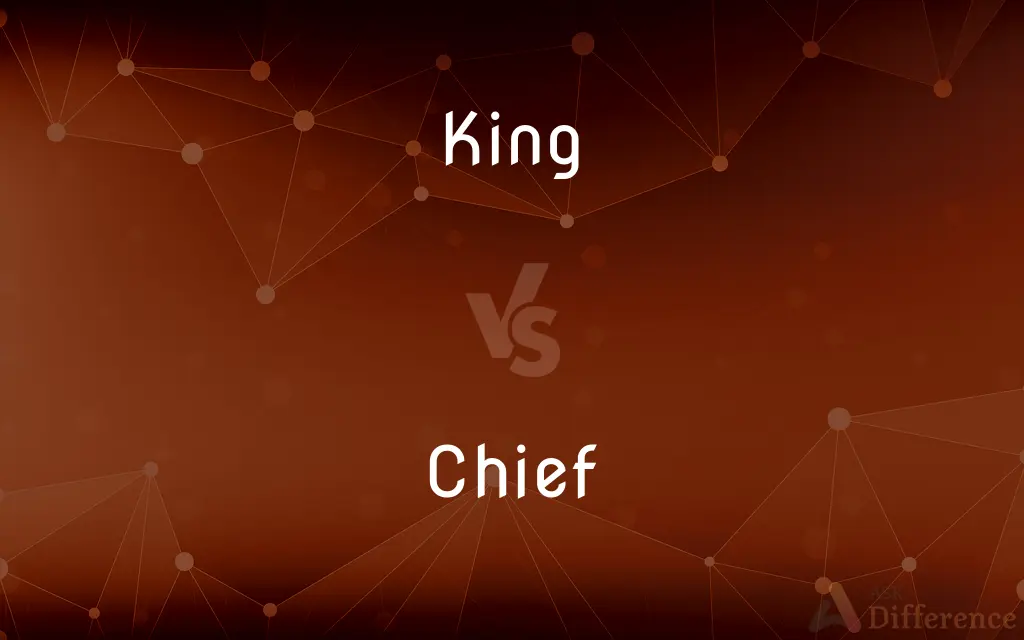King vs. Chief — What's the Difference?
By Tayyaba Rehman & Fiza Rafique — Updated on February 29, 2024
A king is a hereditary monarch who rules a kingdom, often with absolute or constitutional authority, while a chief is a leader or head of a clan, tribe, or community, with authority often based on social position, election, or merit.

Difference Between King and Chief
Table of Contents
ADVERTISEMENT
Key Differences
A king typically inherits his position through a line of succession, often within a royal family, and his rule extends over a kingdom. In contrast, a chief leads a smaller, more localized group such as a tribe, clan, or sometimes a larger community within a nation. The chief's authority can be hereditary or might be acquired through election, merit, or achievement within the group.
This position is usually for life and can encompass absolute authority, where the king has complete control over the state's affairs, or constitutional, where his powers are limited by law or a governing body. For example, a king may preside over ceremonies, enact laws, and represent the nation in diplomatic matters. Chiefs often play a crucial role in maintaining the social and cultural fabric of their communities, mediating disputes, and leading in communal decisions. While a chief's authority is significant within their community, it rarely matches the political scope of a king's power.
Kings and chiefs both hold leadership positions but differ significantly in the scale and source of their authority. A king's role is often tied to the state's identity and continuity, embodying the historical and cultural heritage of a nation. On the other hand, a chief's role is more intimately connected with the day-to-day life and governance of their specific group, focusing on tradition, social cohesion, and the well-being of their people.
The relationship between a king and his subjects is usually more formalized and institutional, with a clear hierarchy and established protocols for governance. Conversely, a chief's relationship with their community tends to be more personal and direct, often reflecting the communal values and traditions of the group they lead.
Both kings and chiefs are leaders, the essence of their roles, the scope of their authority, and their paths to leadership differ markedly. Kings rule over kingdoms with authority that is often absolute or constitutionally defined, while chiefs lead tribes or communities with authority that is more personalized and directly connected to the social and cultural life of their people.
ADVERTISEMENT
Comparison Chart
Scope of Rule
Rules over a kingdom or large territory.
Leads a tribe, clan, or community.
Authority
Absolute or constitutional.
Social, cultural, sometimes political.
Succession
Often hereditary, within a royal family.
Can be hereditary, elected, or based on merit.
Role
Enacts laws, leads in diplomatic matters.
Mediates disputes, maintains traditions.
Relationship
Formalized and institutional with subjects.
Personal and direct with community members.
Duration
Usually for life.
Varies, often until retirement or death.
Symbolism
Embodies nation's identity and heritage.
Represents communal values and traditions.
Compare with Definitions
King
Holds absolute or constitutional authority.
The king met with parliament to discuss the new legislation.
Chief
Plays a crucial role in communal decisions.
The chief and the council decided on the new community project.
King
Embodies the state's continuity and culture.
The king wore traditional robes at the coronation ceremony.
Chief
Focuses on social cohesion and traditions.
The chief officiated at the cultural festival.
King
Often a ceremonial figure in modern states.
The king presided over the national day celebrations.
Chief
Mediates disputes within the community.
The chief resolved the conflict between the two families.
King
Represents the nation in diplomatic affairs.
The king hosted a summit for global leaders at the palace.
Chief
The leader of a tribe, clan, or community.
The chief led the negotiations for land rights.
King
A man chosen as the winner of a contest or the honorary head of an event
A homecoming king.
Chief
Authority based on tradition, election, or merit.
The chief was chosen for his wisdom and leadership skills.
King
A male monarch; a man who heads a monarchy. If it is an absolute monarchy, then he is the supreme ruler of his nation.
Henry VIII was the king of England from 1509 to 1547.
Chief
A leader or ruler of a people or clan
Chief Banawi
The chief of the village
King
A powerful or majorly influential person.
Howard Stern styled himself as the "king of all media".
Chief
An ordinary consisting of a broad horizontal band across the top of the shield.
King
To rule over as king.
Chief
A leader or head of a group of people, organisation, etc.
All firefighters report to the fire chief.
King
A hereditary monarch ruling over a kingdom.
The king decreed a new law to improve public health.
Chief
An informal term of address for a Native American or First Nations man.
Chief
The principal part; the most valuable portion.
The chief of the things which should be utterly destroyed.
Common Curiosities
What is the main difference between a king and a chief?
The main difference lies in the scope of their authority and the manner of their succession, with kings ruling over larger territories often through hereditary right, and chiefs leading smaller groups with varied paths to leadership.
Can a chief have authority similar to a king?
While a chief's authority is significant within their community, it is usually more limited in scope compared to the broader political power of a king.
How does one become a king?
One typically becomes a king through hereditary succession within a royal family, although historical instances of usurpation, election, or conquest also exist.
What is the significance of a king in a constitutional monarchy?
In a constitutional monarchy, a king may serve as a ceremonial figurehead, embodying the historical continuity and cultural identity of the nation, while political power rests with elected officials.
Can a woman be a king or chief?
While traditionally male-dominated roles, many cultures and societies have recognized women in equivalent positions, such as queens regnant or female chiefs, depending on their laws and traditions.
How do kings and chiefs gain their authority?
Kings often inherit their authority through a line of succession, while chiefs may gain theirs through hereditary means, election, or recognition of their merit within the community.
How do communities choose their chiefs?
Communities can choose their chiefs in various ways, including hereditary succession, democratic election, or selection based on the individual's contributions and leadership qualities.
What roles does a chief fulfill in their community?
A chief mediates disputes, maintains traditions, leads in communal decisions, and ensures the social and cultural well-being of their community.
Do kings and chiefs have legal immunity?
In some jurisdictions, kings and certain chiefs may have legal immunities, particularly in ceremonial roles or within traditional legal systems, though this varies widely.
Are there modern examples of kings and chiefs coexisting within the same country?
Yes, in many countries, particularly in Africa and Asia, traditional chieftaincies coexist with national governance structures, including monarchies and republics.
What happens if a king or chief is deemed unfit to rule?
The process for dealing with an unfit ruler varies greatly by culture and legal system, ranging from abdication or impeachment to succession challenges or other forms of community decision-making.
What is the role of religion in the authority of kings and chiefs?
In many cultures, religion plays a crucial role in legitimizing the authority of kings and chiefs, with many considered to hold their position by divine right or blessing.
How do kings and chiefs impact the cultural life of their people?
Both play significant roles in preserving and promoting cultural traditions, values, and identities, often through ceremonies, festivals, and the enactment of traditional laws.
Share Your Discovery

Previous Comparison
Hypersensitivity vs. Allergy
Next Comparison
Lethargy vs. FatigueAuthor Spotlight
Written by
Tayyaba RehmanTayyaba Rehman is a distinguished writer, currently serving as a primary contributor to askdifference.com. As a researcher in semantics and etymology, Tayyaba's passion for the complexity of languages and their distinctions has found a perfect home on the platform. Tayyaba delves into the intricacies of language, distinguishing between commonly confused words and phrases, thereby providing clarity for readers worldwide.
Co-written by
Fiza RafiqueFiza Rafique is a skilled content writer at AskDifference.com, where she meticulously refines and enhances written pieces. Drawing from her vast editorial expertise, Fiza ensures clarity, accuracy, and precision in every article. Passionate about language, she continually seeks to elevate the quality of content for readers worldwide.













































